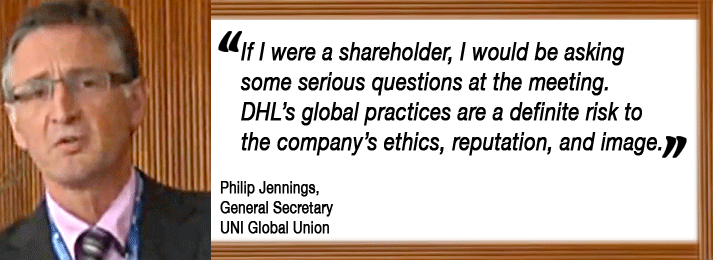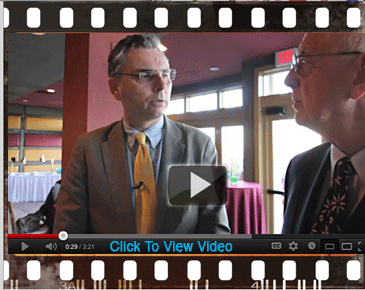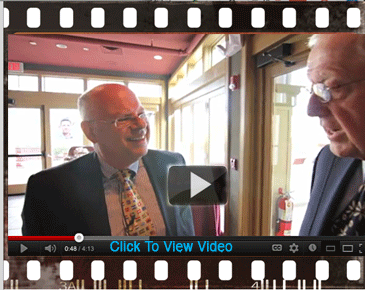| 
From left to right: moderator Ken Dunlap, Director Security IATA;
Doug Brittin, Air Cargo Manager, U.S. Department of Homeland Security,
Harald Zielinski, Lufthansa Cargo Head of Security & Risk Prevention
Management; Neel Shah, Senior Vice President & Chief Cargo Officer,
Delta Air Lines; Tom Puglisi, VP Airfreight Operations K+N; Kemisha
Sherrell, CBP Officer Program Manager, U.S. Customs & Border Patrol
and Tim Perry, Manager of Trade and Regulatory Affairs, APL.
Here is more of our exclusive coverage
of CNS Partnership Conference from Miami, Florida, as Day Two and the
final sessions got off to a sobering start with a keynote address by
Bruno Sidler, CEVA Chief Commercial Officer.
 Mr.
Sidler delivered a candid and unadorned overview of the industry, which
he says is limping on from the 2008-2009 crisis to a short 2009-2010
recovery, into the turbulence of the 2010 sovereign debt crisis in the
West. Mr.
Sidler delivered a candid and unadorned overview of the industry, which
he says is limping on from the 2008-2009 crisis to a short 2009-2010
recovery, into the turbulence of the 2010 sovereign debt crisis in the
West.
Some rays of hope were the BRIC countries
(Brazil, Russia, India and China), intra-Asia, and Germany, where exports
remain strong.
The paradox is that all the while, corporations
are sitting on 2 trillion dollars in cash.
The effect on the airlines has been the
struggle to adjust capacity to cyclical demand and a rapid succession
of boom-and-bust cycles, resulting in an unpredictable, serial volatility.
Mr. Sidler's take is that 2012 may just
turn into a loss-making year, with some or many airlines going out of
business or being consumed by others.
You don’t hear in all of this a
forwarder recognizing, much less admitting the real plight of the airlines
with more than a hint of understanding and, yes, compassion, Sidler
infers.
Another important factor contributing
to these challenges is that today’s supply chains are “highly
compacted” (to use Sidler’s term), with reduced cycle times,
products built-to-order, and low inventory levels, and that these are
nearly constant conditions, worsened by shippers’ poor forecasting.
Mr. Sidler said he believed this state
of affairs is here to stay and the industry must learn how to deal with
volatility, which seems like no easy feat.
He discounted the concerns over the dreaded
shift for air freight commodities to ocean.
The three players–carrier, forwarder,
and shipper—each faced very different realities; for the carriers,
it’s “sweating the assets,” in Mr. Sidler’s
words, driven by poor returns over long periods of time, investments
in aircraft that are big bets on the future, and pure freighter operators
that are pushed to the edge in economic terms while the freighter strategy
of combinations carriers is questionable.
This has resulted in a climate of bitterness
and a “take no prisoners” attitude that is hardly conducive
for business.
For their part, forwarders have evolved
from their classical role as brokers to risk takers, having to depend
on poor forecasting by their customers and the absence of any volume
commitments by shippers, all of which (taken together) turn planning
for the future into a lottery.
The outcome has been a massive short-term
swing in profit margins for the forwarders that can be somewhat countered
by leveraging global spend and forging partnerships.
And the winners are . . . the shippers,
which have enjoyed low rates since 2008, with a short wakeup call between
September 2009 and June 2010.
In this environment shippers seek to lock
in long-term capacity at present pricing, managed by stringent contracts
with challenging terms and conditions.
The end result is volatility, a leitmotif
at this CNS, and a degree of uncertainty that leaves only one clear
conclusion—something needs to change!
The message from the lectern was “let’s
agree on one small step,” such as a focus on forecasting and linking
a forecasting accuracy and volume to pricing, which will generate more
stability for all the players. To achieve this modest goal collaboration,
sharing risks and rewards based on the contribution each party makes
to the supply chain is required, all in an atmosphere of respect and
trust. It’s do or die!
 GACAG
Talk(s) to Action! GACAG
Talk(s) to Action!
This is the title chosen for the GACAG
(global air cargo advisory group) update with Michael Steen, executive
vice president & chief commercial officer at Atlas Worldwide, TIACA
Chairman, and GACAG Chairman.
Michael admits GACAG is an ugly name,
but if repeated often enough it might sound good—now say “GACAG”
ten times quickly!
The group was formed to provide and act
as a unifying platform to speak for the industry with one voice, and
in case you haven’t heard, the founding member organizations are
TIACA, FIATA, IATA, and the Global Shippers Forum.
Starting with a foundation based on position
papers, Michael insists GACAG is now starting to see its work bear fruit,
despite a poll taken at the WCS in Kuala Lumpur this past March that
showed 84 percent of attendees didn’t fully understand what GACAG
does.
In the end, Michael said knowing what
percentage of people in the air cargo industry cared enough to step
up to the plate and become actively involved was equally if not more
important.
It has been recognized that more effort
is needed to educate and promote the work of GACAG and the four key
areas it focuses on—security, e-commerce, customs & trade
facilitation, and sustainability.
The GACAG web site is up and running and
e-updates will be issued regularly to improve communications and visibility.
We learned GACAG has been raising the
awareness for the value of air cargo to the economy.
Michael cited the example of opening a
constructive dialogue with the EU to tackle concerns head-on and combat
the perception that aviation is a major contributor to climate change,
with aviation demand expected to grow and with it, emissions.
In order for the air cargo industry to
develop, it must attract the best talent and invest in newer aircraft
to operate as efficiently as possible, while fighting the proliferation
of taxes and charges.
The message is that we need to drive change,
enable global trade, and establish best practices to demonstrate success.
Michael called on all industry members to cooperate and actively participate
in support of GACAG, whose success ultimately depends on people taking
responsibility to be active in their respective area of expertise.
Security Gets Once Over
The security panel followed, expertly
moderated by Ken Dunlap, director of security at IATA, and featured
a broad mix of disciplines with Harald Zielinski, head of security for
Lufthansa Cargo; Neel Shah, Senior Vice President & Chief Cargo
Officer, Delta Air Lines; Kemisha Sherell, CBP Officer Program Manager;
Doug Brittin, Air Cargo Manager, DHS/TSA; Tim Perry, manager of trade
and regulatory affairs at APL; and Tom Puglisi, vice president airfreight
operations for K+N.
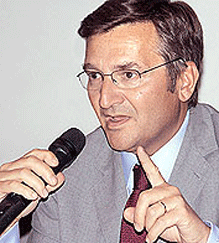
Harald Zielinski
|
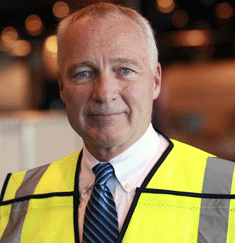
Doug Brittin
|
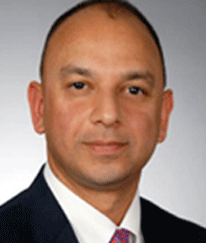
Neel Shah
|
This evolved into a structured group
discussion, with frequent questions and answers from the floor while
each panelist brought their own unique perspective.
Neel Shah stated the objective of how
to implement 100 percent security without destroying the economic survival
of the supply chains.
Neel mentioned sovereignty concerns in
various parts of the world, which are a delicate political issue.
The focus must be on continued good cooperation
with countries that generate the biggest amount of tonnage into the
U.S. Mr. Shah said we needed to get the discussions over varying interpretations
of the rules behind us, and supported by trusted shippers.
Tim Perry shared his experience with Washington,
where the government has learned slowly about transportation in its
various modes and now know “where to look,” which in the
case of ocean freight is with the shipper/manufacturer who owns the
shipment information.
Going back to 2004, “do not load”
has decreased successively over time with more accurate and timely shipper
information.
Kemisha Sherrell talked about the CBP
initiative to develop an enforcement strategy that retrieves necessary
information to target each mode of transportation for advance data while
being on the same page with carriers and forwarders.
She reiterated that more available information
on cargo means better and faster decisions for cleared shipments.
In the Air Cargo Advance Screening (ACAS)
Pilot, only 1.4 percent of all shipments required a manual review, with
response times “within a couple of hours.”
Harald Zielinski talked about the German
screening regime and the realization that the percentage of cargo being
screened by shippers and delivered to the airport is what mattered,
rather than the earlier focus on how many certified, known shippers
were in the program, with certification costs at 50,000 Euros per shipper.
He also mentioned the need for mutual
recognition of security programs.
Doug Brittin set the stage by saying that
the law, as in the 911 Act, was 100 percent cargo screening.
The issue is how that gets accomplished
and should focus on identifying the risk and obtaining information about
the shipper and consignee, moving toward data-driven analysis.
The threat is still there, yet not all
countries have taken their security programs to the same level, even
within the EU; therefore, it must be recognized that not all security
regimes will be satisfactory.
Doug explained that actively participating
in various forums and an industry that speaks with one voice have been
successful strategies in preempting potentially harsh draft legislation.
On cue at noon, Dave Brooks, the outgoing
American Airline Cargo president and CNS advisory board vice chairman,
formally closed the conference proceedings and reflected back on some
15 years ago when the CNS agenda was very different, with more focus
today on things that truly matter. With 570 delegates, this was the
largest CNS conference ever.
Dave encouraged everyone to derive inspiration
from what was heard at the conference, especially GACAG, and encouraged
all to share their expertise and make themselves available to support
the group’s activities. “Still few carry the torch for many
to reach the full potential and deliver benefits to the industry,”
Super Dave said.
Ted/Flossie |




